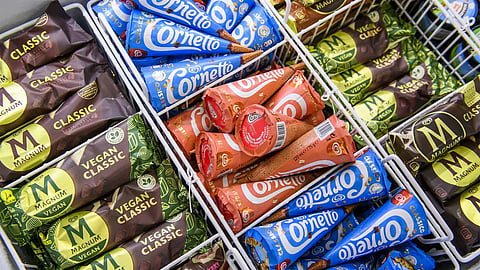
- Home
- EventsEvents
- Product Launches
- CategoriesCategories
- Advertise
- Opinion

Unilever has announced it will grant a free, non-exclusive license to the ice cream industry for 12 reformulation patents, following two successful pilots to warm up its last mile ice cream freezer cabinets.
Access to these patents will help the industry reformulate ice cream products that remain stable at the warmer freezer temperature of -12°C, rather than the current industry standard of -18°C. It is hoped that by sharing these patents with other ice cream manufacturers, the industry will be able to move towards more energy-efficient freezer cabinets across the globe.
Last year, Unilever announced its ambition to increase the temperature of its previous mile ice cream freezer cabinets, ensuring the same quality and consumer experience. Since then, research conducted at Colworth, Unilever’s Global Ice Cream R&D Centre, and two pilots in Germany have confirmed an energy reduction of around 25% per freezer cabinet at the warmer temperature of -12°C, which is better for the environment, and means the freezers are cheaper to run.
Andy Sztehlo, chief R&D officer of Ice Cream at Unilever, said, “We’re pleased to take this next step in our work to increase the temperature of our last mile ice cream freezer cabinets. By granting a free, non-exclusive license to these 12 reformulation patents, we hope our peers and partners from the ice cream sector will benefit and work to tackle emissions across the industry. We believe through collaboration, we can reduce the cold chain’s impact on the environment while continuing to deliver the great quality ice cream products our consumers love.”
Emissions from retail ice cream freezers account for 10% of Unilever’s value chain greenhouse gas footprint. Unilever’s Climate Transition Action Plan (PDF 10.15 MB) sets out the company’s roadmap to reach its climate targets, including achieving net zero emissions across its value chain by 2039, and a science-based target to halve the emissions impact of its products on a consumer use basis by 2030, against a 2010 baseline.
Ice cream freezers include reducing cabinet energy consumption through innovation of the leading technical components (e.g., compressors), exploring programs that will enable the freezers to be powered by renewable electricity, and working towards ‘warming up’ freezer cabinets.
Click HERE to subscribe to our FREE Weekly Newsletter
